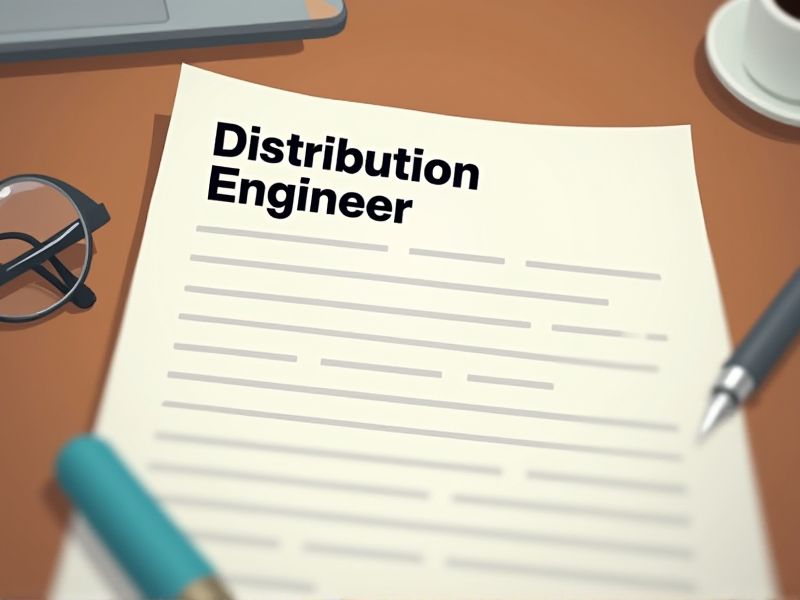
Distribution Engineers manage complex power systems, necessitating a deep knowledge of electrical distribution networks. Certifications help standardize skills and ensure engineers meet industry standards, which increases safety and reliability. Certain certifications validate their proficiency in handling technical challenges and compliance with legal regulations. Consider these important certifications you may need as a Distribution Engineer.
Professional Engineer (PE) - Electrical Engineering
Having a Professional Engineer (PE) certification ensures that an electrical engineering candidate possesses the necessary skills to design and oversee safe and reliable electrical distribution systems. Clients and regulatory bodies often require PEs for their proven competence in adhering to safety codes and standards, which mitigates risks in project execution. Licensed engineers can also take legal responsibility for their designs, offering an added layer of accountability that supports project integrity. Projects overseen by PEs typically experience fewer failures, leading to cost savings and enhanced operational efficiency for utility providers.
Certified Energy Manager (CEM)
A Certified Energy Manager (CEM) brings validated expertise in energy efficiency, which can significantly enhance a distribution engineer's ability to design systems that reduce energy waste. With the increasing emphasis on sustainable practices, a CEM can help ensure compliance with energy regulations, which affects the credibility and operational costs of energy distribution companies. As energy technologies evolve, a CEM's knowledge of the latest energy management strategies can aid distribution engineers in optimizing infrastructure for better cost-effectiveness. A CEM focuses on performance metrics, which equips distribution engineers with data-driven insights for improving system reliability and resilience.
NERC Compliance Certification
NERC Compliance Certification ensures that distribution engineers adhere to standards that maintain the reliability of the bulk power system, preventing widespread outages. Certification facilitates the adoption of uniform practices within the power industry, which enhances operational efficiency and safety. It reduces the risk of regulatory penalties by ensuring that engineers are aware of and can implement necessary compliance strategies. This certification boosts the credibility and professionalism of distribution engineers, fostering trust with stakeholders and customers.
Certified Electrical Safety Compliance Professional (CESCP)
A Certified Electrical Safety Compliance Professional (CESCP) assures adherence to stringent electrical safety standards, reducing the risk of accidents and ensuring a safe work environment. This certification provides distribution engineers with essential knowledge of updated safety protocols, which is crucial given the evolving nature of electrical systems. Proper safety compliance mitigates potential legal liabilities for companies by maintaining regulatory standards. CESCP certification enhances the engineer's credibility and competence, increasing career advancement opportunities within the electrical industry.
Master Electrician Certification
Master Electrician Certification provides in-depth knowledge of electrical systems, enabling Distribution Engineers to ensure proper design and functionality of electrical networks. Understanding of electrical codes and safety standards reduces the risk of system failures and enhances reliability. Certification fosters enhanced problem-solving skills, essential for handling complex distribution challenges. It also increases professional credibility, opening up opportunities for career advancement in the energy sector.
Certified Power Quality Professional (CPQP)
Power quality challenges in distribution systems can lead to inefficiencies and equipment damage, and a Certified Power Quality Professional (CPQP) provides the expertise needed to mitigate these problems. Distribution engineers with CPQP certification possess specialized knowledge to analyze, diagnose, and enhance power quality, improving system reliability. Compliance with regulatory standards is essential, and CPQP-certified individuals ensure alignment with those requirements. Enhancing power quality also results in cost savings for utilities by reducing downtime and equipment failures.
Project Management Professional (PMP)
Project Management Professional (PMP) certification provides distribution engineers with enhanced project management skills, facilitating efficient planning and execution of complex projects. This certification ensures the engineer possesses a standardized knowledge that aligns with global project management best practices. The structured approach from PMP aids in optimizing resources and budgets, essential for reducing system downtime and improving service delivery. Mastery of risk management and communication, gained through PMP, significantly empowers engineers to handle unexpected challenges in distribution projects.
LEED Accredited Professional (LEED AP)
A LEED Accredited Professional (LEED AP) is needed for a Distribution Engineer to ensure the integration of sustainable practices within power distribution systems. A LEED AP brings expertise in energy-efficient solutions, which can result in reduced operational costs and minimized environmental impact. Their knowledge supports compliance with green building standards, enhancing a project's marketability and acceptance. Clients seeking eco-friendly infrastructure prefer engineers with LEED credentials, as this indicates a commitment to sustainability and innovation.
Renewable Energy Professional (REP)
Increasing implementation of renewable energy sources necessitates specialized expertise, which a Renewable Energy Professional (REP) provides, allowing Distribution Engineers to integrate these sources efficiently. Fluctuations in renewable energy generation require advanced grid management techniques, which REPs can help design and implement. Government regulations and incentives for renewable energy adoption demand compliance and strategic planning, roles suited for REPs. Collaboration between REPs and Distribution Engineers fosters innovation, ensuring reliable and sustainable energy distribution networks.
Six Sigma Green Belt Certification
Obtaining a Six Sigma Green Belt Certification equips a Distribution Engineer with essential analytical skills to identify process inefficiencies. This certification enhances their ability to use data-driven approaches to streamline operations and reduce waste. Achieving this level of process excellence can lead to improved reliability and performance of distribution systems. Companies often prefer engineers with this certification for roles that focus on optimizing distribution networks, due to their proven capability in managing complex problem-solving tasks.
Summary
By obtaining certifications, you enhance your credibility and demonstrate your commitment to professional growth as a Distribution Engineer. These qualifications can lead to better job opportunities and potential salary increases, reflecting your advanced skills and expertise. Employers are likely to trust your judgment more on technical matters, resulting in more responsibility and decision-making power. Your comprehensive knowledge will also streamline project execution, improving efficiency and productivity in distribution systems.
